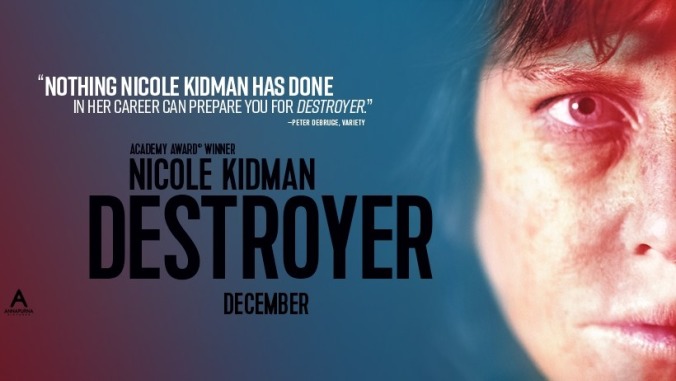Nicole Kidman gets her hands dirty in the gritty L.A. crime thriller Destroyer

Destroyer, the latest from The Invitation director Karyn Kusama, is very much in the mold of antiestablishment ’70s cop movies like Serpico and Dirty Harry, but with a gender-swapped twist: Nicole Kidman stars as Erin Bell, an LAPD detective who’s still scarred by an undercover assignment that went tragically wrong nearly 20 years earlier. Unable to forgive herself for her role in the debacle, Erin let her guilt consume her from the inside like a cancer. Now, she’s a hard-drinking, rage-filled, brittle husk of a woman who regularly sleeps in her car.
But Kusama and Kidman give Erin’s hard-bitten amorality an intriguing twist by making her, for all her violent tantrums, ineffective and eternally frustrated. In the opening minutes of the film, Erin stomps onto a murder scene on the dried-up banks of the L.A. River, demanding information from the cops standing around the body. They tell her to go home and get some rest. It’s a dynamic that repeats throughout the film, as Erin descends back into her own personal hell after receiving a coded message from Silas (Toby Kebbell), the leader of the high-desert gang she and her former partner/boyfriend Chris (Sebastian Stan) infiltrated all those years ago.
Her 16-year-old daughter, Shelby (Jade Pettyjohn), openly despises her. Her ex, Ethan (Scoot McNairy), pities her. Her colleagues make hurtful jokes about her looks and abilities. And the suspects she interrogates—including her former friend and associate Petra (Tatiana Maslany) and sleazy defense attorney DiFranco (Bradley Whitford)—as she tears through the city trying to locate Silas are all sass and backtalk, right up until the moment she starts pounding their faces into jelly. No one takes Erin or her pain seriously, a subtly subversive twist on the “rogue cop who plays by their own rules” that forces viewers to engage with the trope in a more critical way. “How did you think this was going to go?” another character asks Erin after a particularly futile outburst, a question aimed at the audience as much as it is at her.
That largely subtextual twist is indicative of Destroyer as a whole, which is elevated above its unoriginal screenplay by its high level of directorial craft. Kusama’s location shooting is particularly evocative, framing Los Angeles as a gnarled tangle of dusty side streets and low-lying ethnic enclaves that, even when it ventures into wealthier parts of the city, feels worlds away from Hollywood. (It’s telling that the film’s big hillside chase scene takes place on a ridge overlooking Dodger Stadium, not the more famous—and more glamorous—Griffith Park.) Her approach to action is also engagingly pulpy, particularly in an explosive bank robbery scene midway through the film. Combined with the knife-on-bone score by Theodore Shapiro and anemic cinematography by Julie Kirkwood, it’s all so gritty you can practically taste the pollution in the air.
Kidman’s physical transformation for the role is a remarkable thing in itself, on the level of Charlize Theron’s portrayal of Aileen Wuornos in Monster; her bloodshot eyes, skeletal frame, chapped lips, and papery skin betray not only decades of hard living, but a certain spiritual poverty as well. (Underlining the metamorphosis, Kidman loses the prosthetics and dons a heavy brunette wig to play the same character 15 years in the past.) It’s an all-in performance that adds psychological depth to Erin’s raspy-voiced exterior, a collaboration between star and director that lingers long after the specifics of the plot have been forgotten.
Note: This is an expanded version of the review The A.V. Club ran from Fantastic Fest.